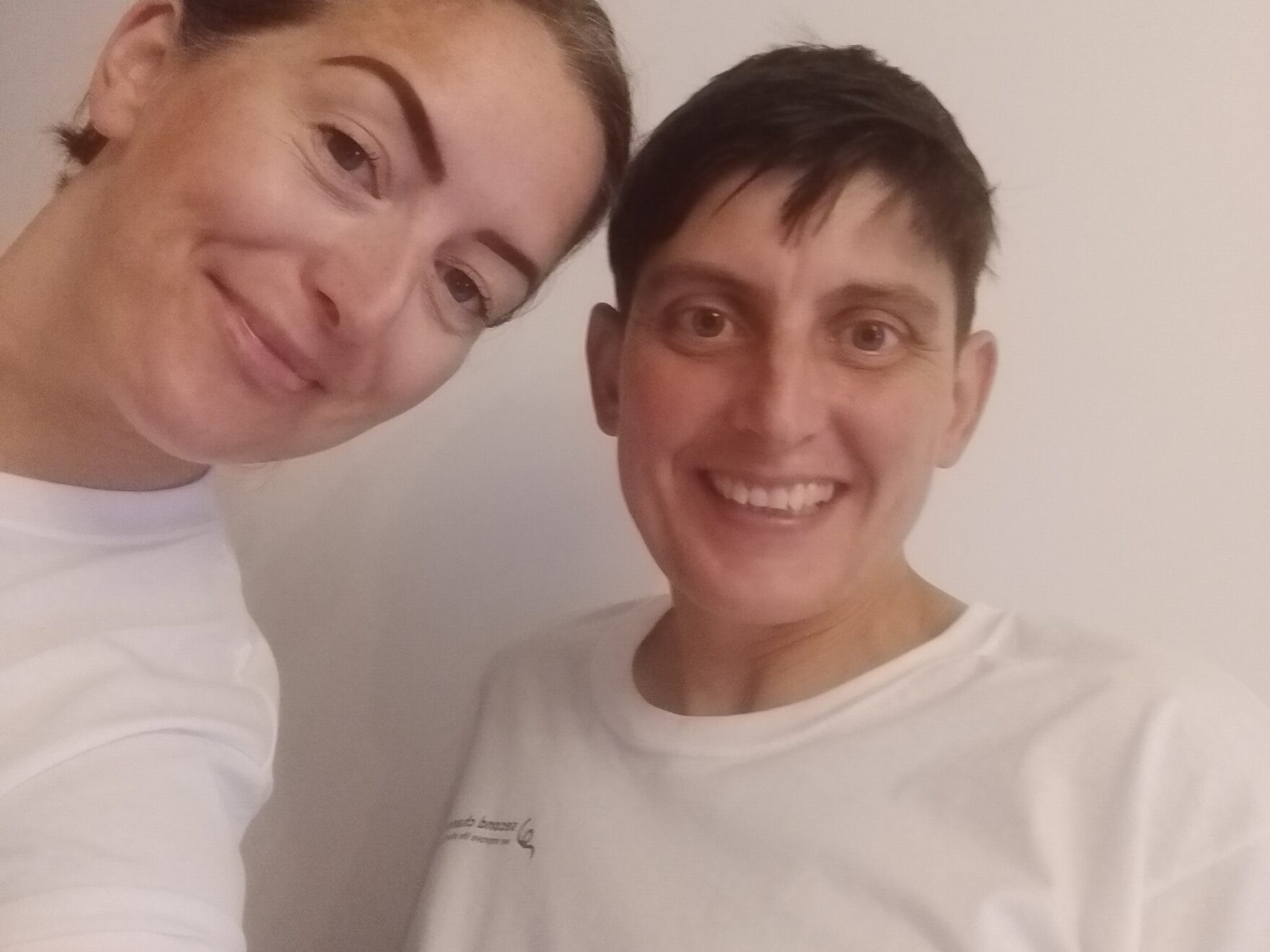Herpes Simplex Virus Encephalitis – Laura and Levi’s Story

Laura share’s her experience of when her partner, Levi, was diagnosed with herpes simplex virus (HSV) encephalitis.
Our story begins in October 2022. The month that changed our lives.
There was nothing remarkable about the day. Just a day when my, then fiancé, Levi, aged 42 felt a bit rough. He laid on the sofa and we put it down to the flu. A few days went by and he was feeling no better, so I took him to hospital.
Levi was struggling with the lights, pulling up his hoodie to hide from the brightness. He was feeling sick, he had a horrendous headache which he described as stabbing in his head and a temperature. After a long wait, we were eventually seen by a doctor who sent him for a CT scan and blood tests. Both the CT scan and the bloods came back as normal.
We were told that Levi was experiencing the new COVID-19 strain symptoms. We were sent away with paracetamol and told to come back the following day for a lumbar puncture but Levi didn’t want to go back to the hospital the following day. His symptoms continued for a couple of more days. I remember him sleeping in bed, occasionally vomiting, not keeping anything down. One particular night, around 1am, he jumped up out of bed, he ran over to the wardrobe doors and flung them all open. He was grabbing at thin air, behaving erratically and bizarrely. I was terrified and had no idea what was going on. I immediately dialled 999 and explained that he appeared to be hallucinating, he was behaving really strangely. I had never been so scared in all of my life.
About 20 minutes later, the ambulance arrived, again advising paracetamol and stating that all these symptoms were indicative of the new strain of COVID-19.
A couple of days later, I again contacted the hospital, and was advised to monitor and if he was no better by the morning – to take him back. Which I did.
Thankfully, a consultant saw him within 2 hours. He examined him and said that he suspected meningitis. At that point, I felt panic. I didn’t know what to do – but I thought at least he is in the right place.
Following this, he eventually underwent a lumbar puncture where his cerebrospinal fluid results showed encephalitis, meningitis and several small strokes. He also suffered a brain bleed as a result of the encephalitis. Initially they thought it was COVID-induced meningo-encephalitis, but the final diagnosis was herpes simplex virus (HSV) encephalitis. He was in a coma and had to be monitored in the intensive care (ICU).
He was in his coma for 2-3 days. When I arrived in ICU he was awake but he didn’t recognise me at first. He looked at me like I was a stranger, all confused. He had lost weight and looked thin. His speech was slurred and his motor skills were impaired. Levi was being medicated now with steroids and acyclovir and once a bed became available I was told he would be moved to a specialist ward. He was initially transferred to the gastro ward where he was under the care of a gastroenterologist, but shortly afterwards moved to the stroke and neuro ward.
I took a month off work and stayed with him as much as I could. He was so anxious and afraid in hospital and seemed only to settle when I was with him for those first few weeks. I stayed as long as I could helping with things like his medication, getting dressed etc and ensuring that dialogue with doctors and the specialists remained open and consistent as well as just ‘being there’ as a comfort for Levi.
He was in hospital for 6 months whilst he underwent various assessments for his eventual transfer to a specialist neuro rehabilitation centre. Levi had an acquired brain injury from what was described as ‘significant brain swelling’. This was at the frontal lobe and the right and left temporal lobes. He stayed in the neuro care home for a year.
Coming home in March 2024 was probably one of the most challenging times for us. The ‘scaffolding’ that had held us up for the last 18 months had gone. It was a really tough time for Levi and a tough time as the person who loved him to try to help him navigate this new normal.
He had gone from being an ex-military man with 22 years’ service – looking forward to a life training as a tree surgeon, hoping to marry and start a new chapter, to not knowing what to do now.
Levi’s mental health took a nosedive and I had to take an extended period of time off work sick to try to help him and get things in place for him. Thankfully, we were taken on by a community brain injury outreach therapy team. We have been supported by therapy sessions and mental health referrals were put in place for Levi. As a carer, I have been attending monthly support groups to meet others in similar situations and Levi has met others who are trying to adjust to life after a brain injury.
As a carer, I think the biggest challenge for me has been managing family and friends’ expectations of what Levi was actually capable of doing in those early days. Because his limitations are invisible (sensitive to noise, unable to retain information, memory loss, cognitive impairments with concentrating and thinking as well as loss of coordination and confusion) people see him and think he is well – that has been difficult for me to deal with.
Levi has now started volunteering once a week at our local village gardening group and spends much of his time in the garden, growing from seed and tinkering in his garage. We get out with our glamping gear and enjoy trips to the seaside and out for meals and drinks in the early evening (before it gets too busy). Life is different, and so are we now. But that’s ok.
Nearly three years in and sometimes I feel sad when I think about the pre-encephalitis days. They were so carefree. I miss them. But I would miss Levi more if he weren’t in my life, hence us, very quietly, marrying just after his discharge from rehab.
I think about just how lucky I am to have him and just how amazing he is to get through what he has in his life.
If you would like to talk to us about encephalitis please contact our helpline.
Story published October 2025
Get help
Our support team are available from 9am to 5pm (GMT), Monday to Thursday, and 9am to 4.30pm (GMT) on Fridays.
To get in touch, simply call +44(0)1653 699599.
Contact our helpline
